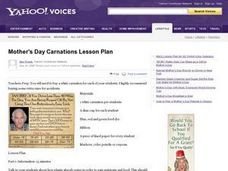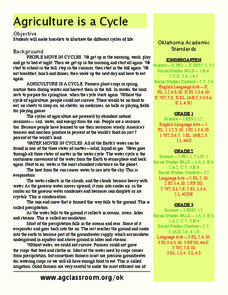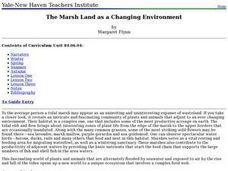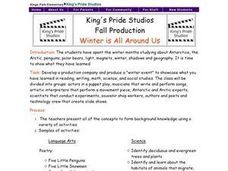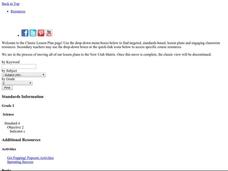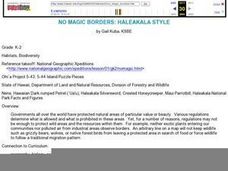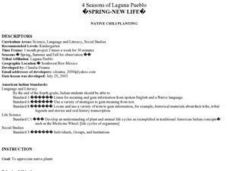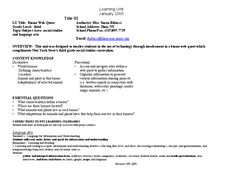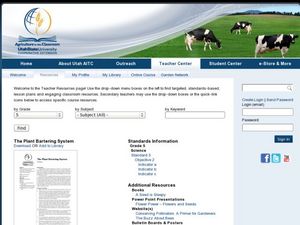Curated OER
Mother's Day Carnations
Students make a carnation craft wtih a carnation, food dye, ribbon, dixie cup, and more. In this carnation lesson plan, students make this craft for Mother's Day.
Curated OER
Where Does Food Come From?
Distinguish between food and non-food items. Recognize that food is obtained from both plant and animal sources. Identify sources for some common animal foods then construct a simple food path from the farm to the consumer.
Curated OER
Where Did Foods Originate? (Foods of the New World and Old World)
What do papayas, peanuts, pineapples, and potatoes have in common? Why, they are foods explorers brought back to the Old World. Young researchers use the Internet to investigate how New World explorers helped change the Old World's diet....
Curated OER
People, Places and Environments
Middle schoolers predict a future for Gary, IN and US Steel Works. They explain how their own town would change if US Steel built this large of a facility in it and discuss why or shy not their town would have been an alternative to...
Curated OER
Agriculture is a Cycle
Students explore cycles in nature. In this cross curriculum agriculture lesson, students define "cycle" and research weather and planting folklore. Students make a bracelet in which individual colored beads represent the many "cycles" of...
Curated OER
Botanical Discoveries
Sixth graders examine the Lewis and Clark Expedition. For this plant discovery lesson, 6th graders put in chronological order the plant discoveries of Lewis and Clark. Students understand the characteristics of leaves and find the area...
Curated OER
The Marsh Land as a Changing Environment
Sixth graders continue their examination of the state of Connecticut. After taking a field trip, they identify the types of birds, plants, invertebrates and vertebrates who make their home in the salt marshes. In groups, they identify...
Curated OER
Winter is All Around Us
Students present what they have learned on Antartica. Students identify deciduous and evergreen trees and plants; identify and study about the habitats of animals that migrate, hibernate, and adapt; study the Aurora and Aurora Borealis...
Curated OER
What's in a Willow?
Students study of nutritional value of edible native plants. discriminate between foods that have nutritional value and those that do not. They relate how food can affect how they think, feel, and perform.
Curated OER
Too Bee Or Not To Bee
Students recognize that bees are important in the reproduction of plants and to the survival of animals. In this bee lesson, students become familiar with the parts of bees and how those adaptations help them pollinate plants. Students...
Curated OER
My Little Seed House
Second graders explore plant life by participating in a germination activity. In this botany lesson, 2nd graders read several books about seed germination including Sunflower House and Tiny Seed. Students identify the necessary elements...
Curated OER
Vermicomposting
Second graders create an eco-bin and study the habitat of the worm in soil. For this vermicomposting lesson, 2nd graders observe the effects of water ( too much or too little) and other factors on the eco-bin.
Curated OER
Verdi
Third graders explore language arts by answering study questions about a book they read. In this reading summary instructional activity, 3rd graders read the book Verdi by Janell Cannon and identify the plot, characters and sequence of...
Curated OER
No Magic Borders: Haleakala Style
Students discuss borders and boundaries. They discuss pollution and the fact that boundaries cannot stop pollution and that pollution affects even protected wildlife and plants. They participate in an activity in which they must place...
Curated OER
Invasive Species
Students use the Internet to research non-native plants that exist in their local community. Using this information, they analyze the invasive species effect on their environment. In groups, they plan and execute their own project to...
Curated OER
With Liberty and Top Soil for All
Young scholars describe the need of plants to have water, soil and sunlight to grow. They use the scientific method when completing experiments. They identify the core democratic values that are needed for a democracy to grow and compare...
Curated OER
Native Chili Planting
Students discover the process of planting chili. After comparing two types of seeds students plant and with the use of a digital camera, record the seed progress. When ready for transplant, students take young plants to a retirement...
Curated OER
Kool Kumara Lesson Plans
Students explore and observe the plant world and acquire knowledge about the functional parts of plants. For this Kool Kumara lesson, students make observations and record specific data on a recording sheet. Students estimation length,...
Curated OER
Growing Seeds
In this science worksheet, students read 5 different scenarios with varied growing conditions for plants. Students make a prediction for each: Will it grow a little, grow a lot, or not grow at all?
Curated OER
Water: to the Last Drop
Middle schoolers research how water played an important role in US history. In this social studies lesson, students make a mock newscast from one of the events they researched. They present their newscast to the class.
Curated OER
What does AG have to do with me?
Students practice alphabetizing while categorizing sources of basic agricultural products. They discuss agricultrual products, discover where they are grown and draw a simple agricultural scene on poster board.
Curated OER
Biome Web Quest
Third graders create paper mache globes, paint them and label the oceans and the continents. In groups, they research a biome, write about it and create an artistic visual representation of the biome and present it to the class.
Curated OER
Advances in Civilization: A Car or a Horse?
Fourth graders investigate the ways in which horses made transportation, hunting and agriculture much easier for the native peoples. They then compare advantages of a horse "back then" to the ease transportation (mainly cars) make on our...
Curated OER
The Plant Bartering System
Fifth graders explore plant characteristics by viewing a flower and seed presentation. In this environmental adaptation activity, 5th graders identify specific traits plants have in order to allow them to grow in different climates...


